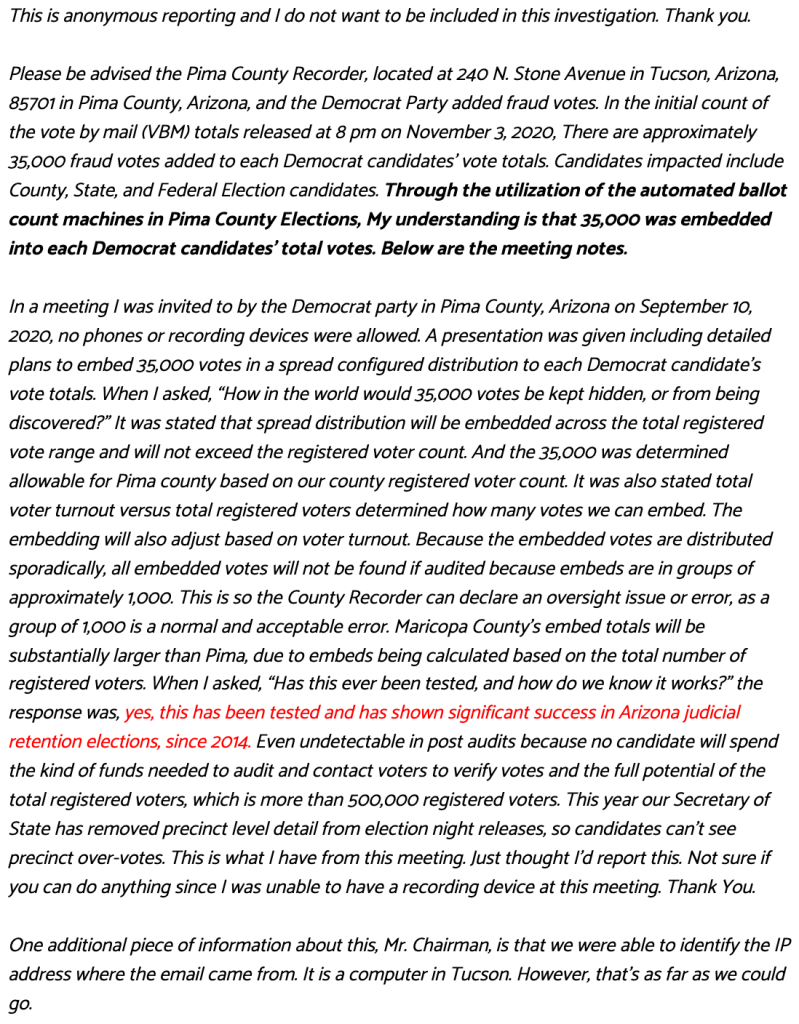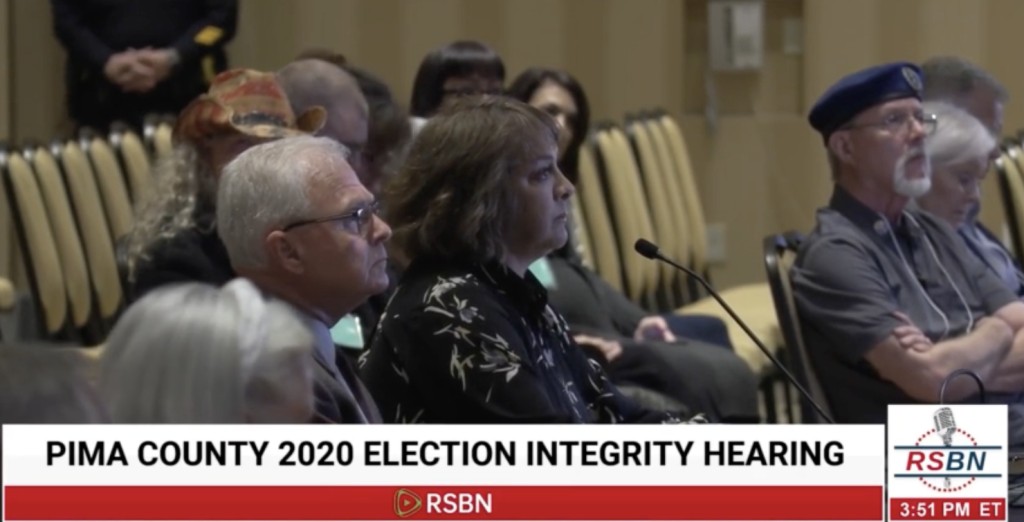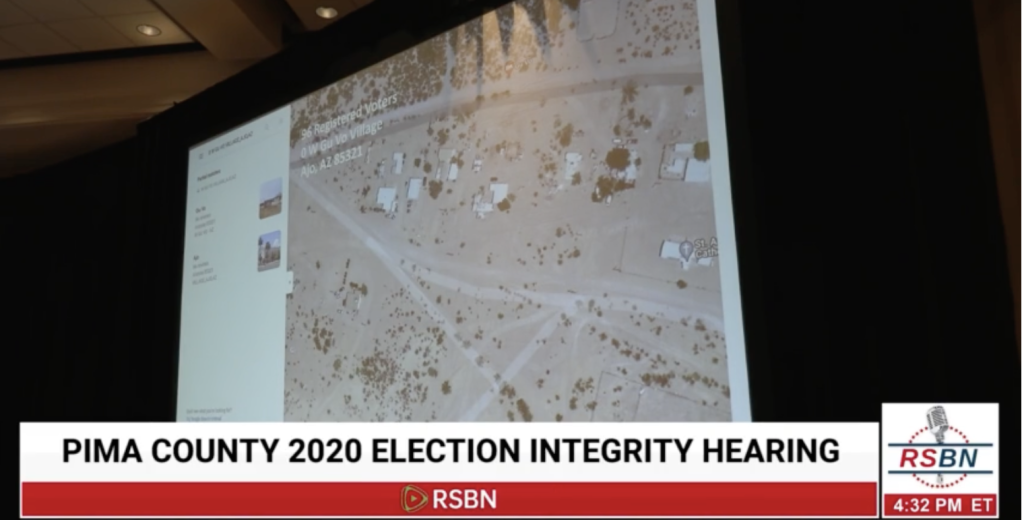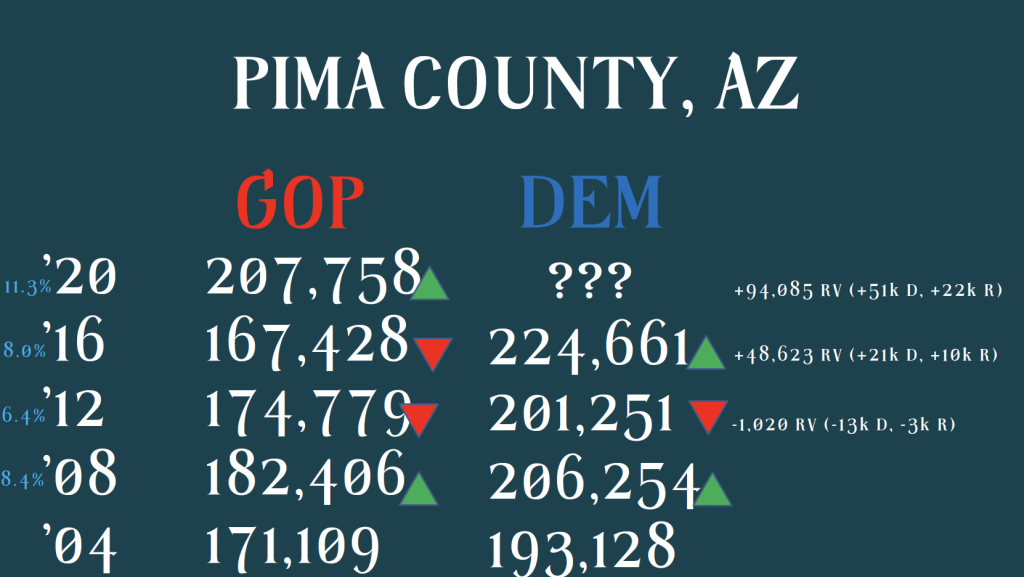Voter registration rolls and the need for good canvassing were a key focus of the Pima County hearing on Dec. 13 in Tucson, Arizona. Coordinated by Rep. Mark Finchem and Sen. Sonny Borelli, the hearing highlighted the need for canvassing initiatives as a way to put to rest many of the remaining questions from the 2020 election. The panel members included State Senator Sonny Borrelli, Senator Wendy Rogers, Senator Kelly Townsend, State Rep. Mark Finchem, Rep. Leo Biasiucci, Rep. Theresa Martinez, Rep. Neal Carter, and Rep. Judy Burges.
Before the hearing started, Finchem spoke about why a Pima County hearing is important to the electorate:
At the beginning of the hearing, Finchem read an email from a whistleblower allegedly showing a plot to "embed" 35,000 votes into the Pima County election for the Democrats. The Oct. 10, 2020 letter was addressed to the criminal division at the DOJ.

 Transcription/Gateway Pundit/Finchem Reads Whistleblower letter.
Transcription/Gateway Pundit/Finchem Reads Whistleblower letter.
Canvassing is time-consuming work requiring a dedicated force of volunteers willing to go door-to-door. As seen in Maricopa County, it was a small group of citizens who performed a canvass. One of the Pima County teams was formed by a couple of citizens, led by Lisa Budisavljevic, who are also licensed private detectives. They performed a canvass in Pima because they were worried about the results of the election. They found similar issues to those found in the Maricopa County canvass; voters who had moved out of state who allegedly still voted in the election, dead voters, and individuals "who had not been at the [canvassed] address for two years." The group went to 152 different addresses that "were associated with 424 ballots." Of the 424 ballots, they "found 68 that were suspicious...or could be potentially fraudulent."
 Canvassing/Lisa Budisavljevic
Canvassing/Lisa Budisavljevic
There was also a digital (maps) and door-knocking canvass led by Pima County GOP Chairwoman Shelley Kais. She knocked on 172 doors "with the potential to interview 481 voters." People answered the door 52 percent of the time. Her group found "62 early ballots where the voter is not a resident." 45% of the people they spoke to "indicated that a ballot was received, but they did not know who the person was." Her team also found the town of Sells—which is next to a reservation—had more people voting than those who live there. Kais explained her findings:
"The population of Sells, Arizona is 2,121. There are 675 housing units, of which 591 housing units are occupied. 64.8% of the population is over the age of 18 and, therefore, eligible to vote. That would make 1,375 people eligible to vote in Sells, Arizona. Our data shows that 2,762 people are in the voter database. That's double the people eligible to vote according to the 2020 census."
 Kais Testimony/Pima Hearing
Kais Testimony/Pima Hearing
Kais confirmed, for example, that there were 1,133 registered voters in one location in Sells. She says the location may well be a "chamber house" because sometimes individuals on reservations do not have an address and use an agreed-upon location for their registered address. A discussion ensued about using coordinates for reservation dwellings to avoid the issue of multiple registrations at one address. She also mentioned having found a fraternity, Sigma Alpha Epsilon, that had 27 registered voters with an average age of 45. In her canvassing sample, she showed 68 instances where more than 16 people voted from the same location.
Sells is the "Capitol" to a large Indian reservation in Topawa, Arizona. According to the Tohono O'odham Nation website, the Nation "is a federally-recognized tribe that includes approximately 28,000 members occupying tribal lands in Southwestern Arizona. The Nation is the second-largest reservations in Arizona in both population and geographical size, with a land base of 2.8 million acres and 4,460 square miles, approximately the size of the State of Connecticut. Its four non-contiguous segments total more than 2.8 million acres at an elevation of 2,674 feet. The largest community, Sells, functions as the Nation's capitol."
Reservations and cities around them are often targeted by political operatives before and during elections in bribe-for-votes schemes, phantom voters, and multiple ballots sent from the same address.
Kais said that in Topawa, there were multiple locations with large numbers of voters. The population there is 233 individuals. For example, at one location alone, there were 173 voters. The voting age population size should be 182, but she found 288 registered "voters" in Topawa. That is a 158% registration rate.
The Pima County hearing reaffirmed that there were no official canvassing efforts. When the independent auditors and the Senate Republicans attempted to make canvassing a part of the audit effort, both the Democrats and the DOJ fought any efforts to run an official canvass.
Doug Logan, CEO of Cyber Ninjas—the lead forensic auditor in the Maricopa County election investigation—testified in the hearing that the Democrats resisted a canvass because they were worried private voter information would be revealed in the process; which is a "civil rights violation." In fact, as Logan explained, all canvassers would have asked about would have been "the method of the individual's vote, if the person voted—yes or no— and when they voted. The goal is to close the loop so that only those who are registered voters vote."
Pima County is second to Maricopa County in terms of size. Only limited, citizen-initiated canvasses have been performed in the two counties. Pima produces about 15 percent of the state's votes and is a Democrat-heavy county. Clean voter registration rolls would greatly contribute to election integrity in the state.
Seth Keshel's slides allegedly showed that the state did not show population growth commensurate with the numbers of registered voters, indicating the rolls are bloated with fraudulent voters. Keshel has closely studied voter registration trends after the 2020 election. On his Telegram channel, he explains that voter registration "is the most accurate indicator of election trajectory" and can be used to identify issues in elections.
Keshel also said during the hearing that Pima County voter registration numbers in 2020 stretch credulity. There was a gain of 94,085 registered voters in 2020 when in previous elections, the number had been half that many or much less.
 Seth Keshel/Chart/Pima Hearing
Seth Keshel/Chart/Pima Hearing
State GOP Chairwoman, Kelli Ward, gave some highlights from the hearing, emphasizing the need to clean Arizona's voter rolls. She states that more than 20 precincts were canvassed in Pima, showing some significant evidence that must be investigated. She also mentioned the SolarWinds breach, which may have compromised Pima County servers, per Doug Logan. Logan stated that Pima County was affected, but investigators were never told to what extent the breach may have affected data on the servers.
Other issues mentioned included issues with record-keeping, data files, duplicate passwords, alleged internet-connected voting systems, issues with chain of custody for ballots and thumb drives, and the fact there were allegedly "no current certificates of accreditation" for the voting machines, which would technically render the votes cast to be illegal. There was also alleged evidence of finagling of dates on the certificates once the lapsed certification was pointed out, according to Ms. Eldon, who testified on the matter. The Help American Vote Act (HAVA) requires that election equipment be accredited by approved contractors every two years. Election equipment is designated as "critical infrastructure."
Phil Evans spoke about algorithms and mathematical analysis of the election, mentioning Dr. Shiva's Fishtail report. He shared what he called a "major anomaly," as he posted a graph of the 249 precincts in Pima County and described Shiva's findings. He conjectured that it was possible that a "high number of illegal ballots" may have been injected into certain precincts, creating an artificially high turnout in Democrat precincts—altering the election results in an election that only gave Biden a margin of about 11,000 votes in the state.
Senator Wendy Rogers assembled some notes on the hearing and posted them on her website:
 Wendy Rogers' Noteshttps://wendyrogers.org/wendy-rogers-notes-from-the-pima-county-hearing/
Wendy Rogers' Noteshttps://wendyrogers.org/wendy-rogers-notes-from-the-pima-county-hearing/
Doug Logan emphasized that ballots are not being regarded seriously enough in America, reminding the panel that "ballots should be seen as currency." Rep. Finchem perked up in agreement with Logan's statement because he has been doggedly pursuing watermarked, serialized security ballots for elections. He has been in contact with Secretaries of State across the country. Some attended Monday's hearing and spoke about their commitment to election integrity.


